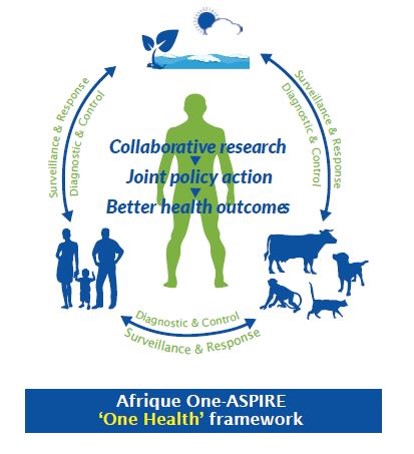28 September 2017
The Afrique One-ASPIRE research consortium with its Thematic Training Programme (TTP) on rabies control and elimination is playing a lead role in developing the African research agenda towards the elimination of human deaths from dog-transmitted rabies by 2030, a goal put forward by the World Health Organization (WHO) and partners in December 2015.
The One Health: core of the agenda
 This agenda is strongly based on the One Health principle that embraces close collaboration between veterinarians, human health workers, social scientists and health economists as well as close engagement with community stakeholders and policy-makers. Large-scale vaccination of domestic dogs forms the mainstay of canine rabies elimination strategies, and research into development of sustainable strategies for coordinated and comprehensive dog vaccination campaigns is a central focus of activities in the rabies TTP within Afrique One ASPIRE. In line with the One Health principle, the Afrique One-ASPIRE rabies research agenda explores ways to improve communication between the animal and human health sector and to enhance access and optimize use of Post Exposure Prophylaxis (PEP) through an Integrated Bite Case Management (IBCM) approach. Further community-based research aims to understand determinants of access to animal and human vaccination and aspects of dog-human relationships and interactions that are important for dog population management.
This agenda is strongly based on the One Health principle that embraces close collaboration between veterinarians, human health workers, social scientists and health economists as well as close engagement with community stakeholders and policy-makers. Large-scale vaccination of domestic dogs forms the mainstay of canine rabies elimination strategies, and research into development of sustainable strategies for coordinated and comprehensive dog vaccination campaigns is a central focus of activities in the rabies TTP within Afrique One ASPIRE. In line with the One Health principle, the Afrique One-ASPIRE rabies research agenda explores ways to improve communication between the animal and human health sector and to enhance access and optimize use of Post Exposure Prophylaxis (PEP) through an Integrated Bite Case Management (IBCM) approach. Further community-based research aims to understand determinants of access to animal and human vaccination and aspects of dog-human relationships and interactions that are important for dog population management.
Guarantees of the success
The strong roots of the consortium in the international rabies expert network (Pan African Rabies Consortium, Global Alliance for Rabies Control, Partners for Rabies Prevention) and links to the WHO, OIE, FAO tripartite ensure that research results of the consortium can be readily used to inform and guide policy recommendations at national, regional and international level, including establishment of national and regional Rabies Action Plans.
Share on: